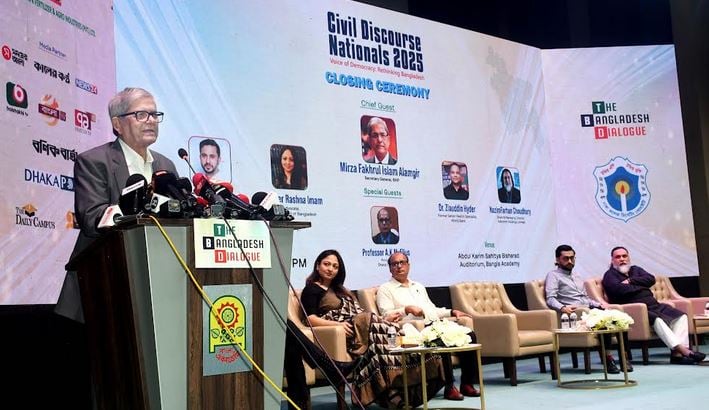Blaming the legacy of Pakistan’s political system for the country’s enduring democratic deficit, BNP Secretary General Mirza Fakhrul Islam Alamgir said that democracy never truly took root in Bangladesh.
“We believe I must have the freedom to speak, and so must you. That is real democracy. Unfortunately, Bangladesh has never truly experienced such a democratic culture,” he said while addressing a discussion on “Civil Discourse Nationals 2025” at Bangla Academy, hosted jointly by the Bangladesh Dialogue and the Dhaka College Debating Society on Tuesday.
The Bangladesh Dialogue is a youth-led civil political platform consisting of lawyers, businessmen, teachers, students, and activists.
Fakhrul acknowledged that while there were brief periods of democratic practice, they were fleeting and failed to evolve into a lasting democratic culture. “The spirit of democracy requires active debate, tolerance of dissent, and humility from those in power. But we have strayed far from that path,” he said.
Criticising the excessive reverence shown to political leaders, Fakhrul said: Even the continued use of the term “honourable” before referring to the prime minister or the House speaker reflects a mindset that nurtures autocracy. I believe this culture of glorifying leadership is one of the reasons democratic values could not flourish in Bangladesh.
Reflecting on his time as a state minister under a previous BNP government, Fakhrul recalled, “Whenever I travelled outside Dhaka, I would be given a long salute at the circuit house. The entire performance made me feel as though I was someone extraordinary. This perception creates a disconnect between public representatives and the people.”
To illustrate the contrast, he shared a memory from the 1971 Liberation War, when he had been in India.
“While staying at West Bengal, I once saw a car arrive followed by a single vehicle as part of its security detail. A man eventually got out, and I saw that it was the chief minister of Bihar. He had come alone, with just one person beside him, to meet us, the refugees and freedom fighters from Bangladesh. That kind of humility from a leader left a lasting impression on me,” he recounted.
Fakhrul lamented that today’s leaders have surrounded themselves with layers of privilege and protocol, creating a gulf between themselves and the public. “This elitism is a major barrier to democratic practice and accountability,” he added.
He also expressed concern over the widening generational gap in politics. “There’s a large disconnect between the older and younger generations. We struggle to understand them, and they struggle to relate to us. This gap is one reason we see political apathy among the youth,” he said.
Referring to a recent survey published in a national daily, he noted that only 1.87% of Bangladesh’s youth are interested in politics. “As a politician, that number deeply disappointed me. But after coming here and listening to the youth today, my hope has been renewed,” Fakhrul said.
The BNP secretary general praised the young participants for their intellect and vision. “Today’s youth are better prepared than we were. They are capable of leading the nation forward, and I believe they will play a greater role in shaping our future,” he said.
Underscoring the need for debate and disagreement in a democratic society, Fakhrul said: We may not agree with each other, but we must defend each other’s right to speak. That is the essence of democracy, a democracy that we must fight to build in Bangladesh.
Dhaka College Principal Professor AKM Elius, former senior health specialist of World Bank Ziauddin Hyder, Supreme Court advocate Barrister Rashna Imam, among others, were also present at the event.


